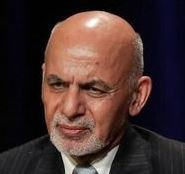U.S. Steps Up Scapegoating of Ghani Amid Scrutiny of Afghan Collapse

Ashraf Ghani
Michael Hughes
November 1, 2021
Considering the Americans – for years – have gone to great lengths to obfuscate the reality on the ground in Afghanistan, it is only fitting that Washington is trying to muddy the waters as to how and why the war ended in such a disastrous manner and who bears the most responsibility. Of course, the very moment Kabul collapsed the Biden administration blamed Afghan forces and the government, but efforts to paint its former puppet as villain number one are becoming increasingly hard to swallow as the smoke clears.
Secretary of State Antony Blinken executes the blame Ghani strategy automatically whenever pressed on whether the U.S. could have done more, just as he did in a recent interview.
“I was on the phone with President Ghani on a Saturday night pressing him to make sure he was ready to agree with the plan we were trying to put into effect to do a transfer of power to a new government that would’ve been led by the Taliban but been inclusive and included all aspects of Afghan society,” Blinken said on CBS’s Face the Nation on Sunday, October 31. “And he told me on the phone he was prepared to do that, but if the Taliban wouldn’t go along, he was ready to fight to the death. And the very next day, he fled Afghanistan.”
The recently-departed envoy Zalmay Khalilzad has also been at it, making the rounds in a farewell tour of sorts to make sure his legacy as the great dealmaker remains intact.
“We were all surprised by the intransigence of President Ghani in insisting on staying in power till his term ended, despite the fact that he had come out re-elected in a fraudulent election that very few Afghans participated in,” Khalilzad said on October 27 during a Carnegie Endowment for International Peace webinar.
Villainizing Ghani is so much easier than explaining how Washington was so unprepared despite knowing full well the Afghan government and armed forces were built on a flimsy foundation that grew more fragile by the year. In fact, U.S. lies about the progress of the war and the solid state of the Afghan military were repeatedly exposed publicly by watchdogs, the Taliban themselves, not to mention the Pentagon’s own data.
In June of 2018, for example, as covered in these very pages, then-U.S. Forces Afghanistan Commander General John Nicholson tried to persuade us that they were seeing progress on the ground. And yet, according to district control data, the Taliban were winning.
In 2019, the mega dump by The Washington Post, dubbed the “Afghanistan Papers,” amounted to seething indictments of how the Bush and Obama administrations deceived – or at least tried to deceive – the public on what was really going on inside Afghanistan since the fall of the Taliban in 2001.
On the day of the release, former State Department Political Officer Matthew Hoh had said U.S. generals, diplomats and officials on all levels – up to the Oval Office – spun facts and misrepresented the true nature of the war “to keep the American empire.”
Blinken’s latest attempt to blame Ghani must be seen in the context of recent condemnations of his agency’s role in hiding information that – if acted upon – could have prevented the type of fiasco that eventually unfolded.
“In my opinion, the full picture of what happened in August – and all the warning signs that could have predicted that outcome – will only be revealed if the information that the Departments of State and Defense have already restricted from public release will be made available,” Special Inspector General for Afghan Reconstruction (SIGAR) John Sopko told reporters on October 26.
For example, he added, the Pentagon restricted from public release a range of information going back to 2015 on the performance of the Afghan security forces – purportedly at the request of Kabul. This included, the watchdog pointed out, information such as casualty data, unit strength, training, operational deficiencies, and tactical readiness of Afghan military leadership.
“In essence, nearly all the information you needed to know to determine whether the Afghan security forces were a real fighting force or a house of cards waiting to fall,” Sopko said. “In light of recent events, it is not surprising that the Afghan government, and likely some in DOD, wanted to keep that information under lock and key.”
In the wake of the collapse, Sopko had mocked the State Department’s request to temporarily suspend access to all audit reports because such information, according to the brain trust at Foggy Bottom, may put Afghan allies in “jeopardy.”
Of course, now we all know it was the U.S. administration that was in jeopardy of – once again – being exposed.
